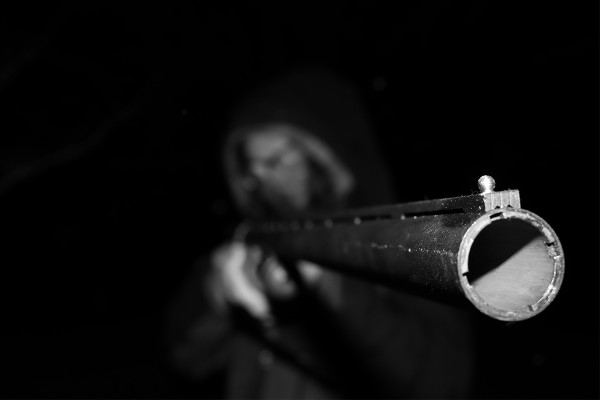
You just shot a man and now he’s lying on the ground not moving. It all happened so fast – just like they say.
You were walking back to your car from finishing dinner with friends. Out of nowhere, a stranger leaped into your path and wrestled you to the ground. You both struggled, you yelled for him to get off, he didn’t, and you finally managed to pull away long enough to retrieve your concealed carry weapon and fired a shot. Your shot hit him in the chest, and he’s now on the ground not moving.
Your heart rate is cranked. Your hands are shaking. You can hear your heartbeat pounding in your ears. You take deep breaths and try to calm down, but your mind is running a mile a minute, making it impossible to calm down.
What now? Do you call the police? A lawyer? Your mom?
If you’re a CHP holder, you have a legal and moral responsibility to think through this very scenario long before it actually happens. Hopefully, it never does. But you still need to be equipped with the knowledge and resources for managing the aftermath of justified use of deadly force – including retaining legal services.
Unfortunately, even if you’re completely justified in using a firearm in your self-defense, you’ll likely have to defend those actions in a court of law. It’s just the world we live in. There’s no way around it.
However, with a little forethought and preplanning, you can better prepare yourself to manage the aftermath of the scenario just described.
First, do your best to calm down and gather your thoughts. Take deep breaths and collect yourself as you make the first key call: 911.
Second, give the dispatcher the following pieces of information:
- Your first and last name
- Your location
- Tell them you were just attacked and have “SHOT” your attacker. Do not use the word “kill” under any circumstances, even if you’re positive the attacker is dead. You should also avoid describing your attacker – particularly his/her race or ethnicity. It’s a distraction.
- Tell the dispatcher you might be hurt as well so please send two ambulances. You really might be hurt as well and just don’t know it yet because your adrenalin is still pumping. And besides, for optics sake, which unfortunately matters now, it’s best to be seen leaving in an ambulance.
- Tell the dispatcher that you’ll wait there for the police and then HANG UP THE PHONE!
You are NOT legally obligated to remain on the line, even if the dispatcher requests that you do so.
Remember, the dispatcher works for the police – not you. For three very specific reasons, you should not remain on the line after you report the incident to 911.
- You’re going to be busy calling your lawyer so you can be fully represented BEFORE the police arrive on the scene.
- Everything is being recorded, including things in the background that have nothing to do with you, and potentially other variables not in your interest to have factored into your eventual court proceedings.
- You just shot and possibly killed another human being. Unless you’re Clint Eastwood, you’ll likely be a frazzled, frantic mess, vulnerable to saying something stupid.
Third, immediately after you hang up with 911, you need to call your attorney or the hotline of your concealed carry insurance. I highly recommend that you invest in a membership with U.S. Law Shield, USCCA, or a similar group. The primary benefit of membership with these groups is the ability to call a hotline and in seconds be connected to an attorney.
NOTE: Right after defending yourself with a concealed carry weapon is not the time to be shopping for a lawyer. You need to have the phone number for an attorney or service already stored in your phone and ready to go at a moment’s notice.
Fourth, as you see the police arriving on the scene, you need to remove the magazine from your firearm (or open the cylinder of your revolver), lock the slide back and place both the gun and magazine on the ground in front of you. Then place your hands on your head and slowly back away from your weapon, doing anything and everything to communicate to the officers that you mean them no harm.
NOTE: Don’t put your weapon on the ground before the police arrive in case your attacker wasn’t working alone and/or in case someone in the vicinity foolishly decides to become involved.
Fifth, you’ll likely be handcuffed and/or sat down on the ground so police can question you. In a polite tone of voice, thank them for getting there so quickly but inform them that your attorney is on his/her way and you’ll wait for him/her to arrive before answering questions. You’ve now requested counsel and the police are supposed to stop questioning you.
Now you need to wait for your attorney to arrive before saying or doing anything else. Don’t worry – it’s not an admission of guilt to immediately request an attorney. The request alone can’t be used against you later in court either. Everyone is entitled to counsel, and you now need an outside party advocating on your behalf.
It’s a proven fact, known especially to law enforcement officers, that it takes the average human being 48-72 hours to fully process a traumatic event as I’ve described here. Think of your brain as a computer and you’re now trying to download multiple large programs at once. It’s going to take some time.
Your experiences from this point on will be heavily determined by the protocols and policies of the police department. In many places, even if the police believe you’re telling the truth, you’ll likely be taken to the police station and maybe even kept overnight while they finish their investigation.
No matter what, your firearm will likely be confiscated. Depending on police findings, you might be able to get it back later. That’s a secondary concern though – your focus needs to be on defending your actions and staying out of jail. You can worry about your gun later.
Last, always remember that in today’s high-tech world, there’s a decent chance your attack was caught on camera. That could work for you or against you, depending on the claims you make during questioning.
Again, talk to your attorney first and get your TRUE story straight before speaking with investigators.
Having to use deadly force to defend yourself can be a frightening matter, but if you keep calm and remember these tips, you should be well prepared to handle this stressful situation.



